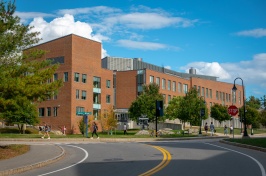Job Loss, Water Pollution Concern Downeast Mainers, New Report Finds
DURHAM, N.H. - Loss of fishing jobs and income is the top environment-related concern among residents of Maine's Hancock and Washington counties, a new survey by the Carsey Institute at the University of New Hampshire finds. Washington County residents also rate forestry decline as an environmental issue that has had a major effect on their lives and community. In Hancock County, water pollution ranks high as an environmental concern. Across a wide range of environmental issues, political party affiliation is associated with level of concern about environmental problems.
"The coast of Maine is a microcosm of broader social and environmental change in rural coastal communities across the United States," says UNH professor of sociology and Carsey Institute senior fellow Lawrence Hamilton, who co-authored the report with Carsey Institute faculty fellow Thomas Safford. "Rapid increases in tourism, declining fisheries, and growing threats from pollution are bringing both social and environmental change to Downeast towns and villages."
"The desirability of living and vacationing on the coast has made rural coastal areas targets for development, drawing new residents and economic activity as traditional ocean-related activities decline," says Safford, an assistant professor of sociology at UNH. The report notes that Maine has the highest percentage of housing units classified as second homes (15.6 percent) in the U.S., and Hancock County - home to vacation destinations Acadia National Park and Bar Harbor - is among the three fastest-growing counties in Maine, driven partly by second-home development.
Rural Downeast communities are considered to be the most fishery-dependent in all of New England, and the high levels of concern about loss of fishing jobs and pollution effects on water resources reflect this. Other key findings from the report, which surveyed the environmental views of 1,500 residents of these two coastal counties in Downeast Maine, include the following:
- In addition to loss of fishing and forestry jobs and water pollution, sprawl or rapid development and climate change rank high as concerns.
- Coastal environmental problems that most concern Downeasters are pollution of beaches or shellfish beds, contamination of seafood, and overfishing.
- Across all of the coastal environmental issues, those who self-identify as Republicans are less concerned than Democrats or Independents, which will affect community consensus and have implications for policy makers.
- More people of all political persuasions favor leaving government regulations of commercial fishing or lobstering as they are, rather than regulating more or less.
The survey of these Downeast Maine counties is the latest in the Carsey Institute's Community and Environment in Rural America (CERA) initiative, which aims to learn how a broad cross section of Americans view the social and environmental changes affecting their lives and rural communities.
The report, called "Ocean Views: Coastal Environmental Problems as Seen By Downeast Maine Residents," is available to download here: http://www.carseyinstitute.unh.edu/publications/PB_Safford_DowneastMaine.pdf
It was supported by the Ford Foundation.
The Carsey Institute conducts policy and applied research on vulnerable families and on sustainable community development, giving policy makers and practitioners the timely, independent resources they need to effect change in their communities. Learn more at http://carseyinstitute.unh.edu/.
The University of New Hampshire, founded in 1866, is a world-class public research university with the feel of a New England liberal arts college. A land, sea, and space-grant university, UNH is the state's flagship public institution, enrolling 12,200 undergraduate and 2,200 graduate students.
-30-
Reporters and editors: Report co-author Larry Hamilton is available for comment at 603-862-1859 or mailto:lawrence.hamilton@unh.edu"
Latest News
-
October 24, 2025
-
October 8, 2025
-
October 2, 2025
-
September 24, 2025
-
September 15, 2025















































